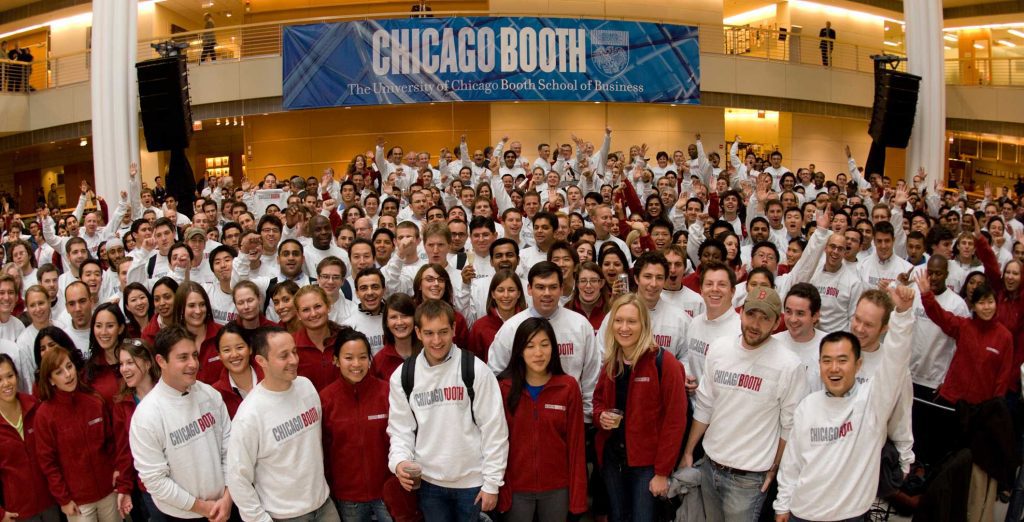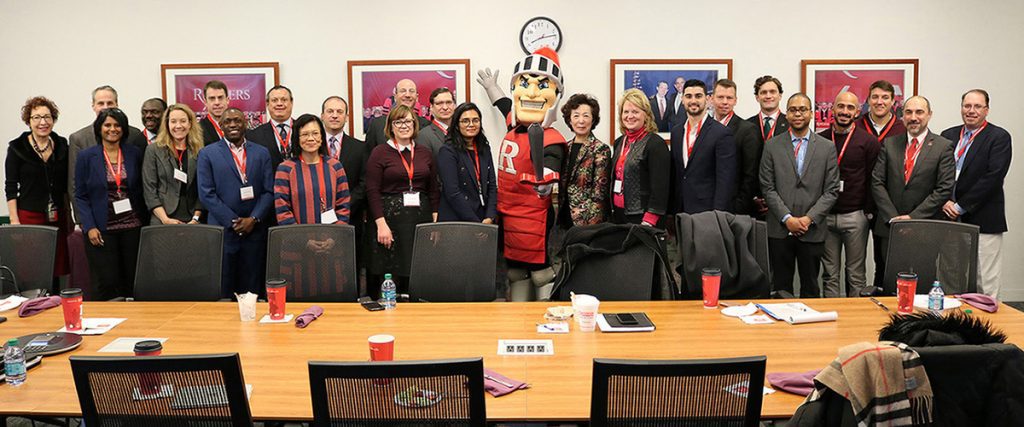How Can You Get a Job at Boston Consulting Group in 2018?

Boston Consulting Company—a global management consulting firm— has offices across more than 90 cities and 50 countries, advising clients in the private, public, and not-for-profit sectors, including a healthy chunk of Fortune 500 companies. Considered one of the most prestigious management consulting firms in the world, BCG was ranked fourth in Fortune’s “100 Best Companies to Work For” in 2018.
But, how can an MBA help you land a BCG job?
Working for BCG
According to Management Consulted, BCG has a demanding recruiting and hiring system. The firm hires undergrads as associates who work for two to three years before moving on or pursuing an MBA. However, it is very difficult and highly unlikely for an associate to make the leap to consultant without an MBA. If you’re hired as an MBA, you enter as a consultant with plenty of room for growth—to project team leader, principal, and then, finally, as a partner partner.
According to former BCG senior partner Lucy Brady, the company looks for a candidate’s record of academic and professional success, but also want to hire candidates who have overcome setbacks.
“We look for resiliency and adaptability, and the ability to learn from your mistakes and grow from them,” she said in a previous interview.
CNN revealed that 11.72 percent of MBAs want to work for BCG. However, BCG’s recruiting process is demanding, with Glassdoor previously ranking the firm among the most difficult companies to interview with.
The high job demand and lengthy interview process isn’t without reason: MBAs typically thrive at BCG due to the companies the emphasis on career development. BCG’s PTO (predictability, teaming, and open communication) policies allow for a healthy work-life balance for employees, which has paid numerous dividends. Internal surveys have shown that the program has led to a 74 percent increase in reported intentions to stay with the company for the long term. BCG was also among the companies that signed the 2016 White House Equal Pay Pledge.
BCG Recruiting on Campus
BCG actively recruits students on college and university campuses around the world. Campus visits are a way for students to connect with BCG, learn more about potential job opportunities, and feel out whether a career at BCG is a good fit.
“We have a presence at many of the top universities across the U.S., including Harvard, Stanford, the University of Pennsylvania, Northwestern, University of Michigan, Duke, and the University of Texas,” Tina Gao, BCG recruiting director, said in a previous interview. “We come to campus and hold a presentation to introduce the company and then are available for Q&A sessions. We also come back to help people train for our interviews and learn more about the company. We’ll come back to campus to interview the candidates we choose.”
You can see more upcoming BCG on campus events here. However, if your campus does not have a dedicated page, BCG encourage students to complete an online application for consulting internships.
BCG Internships
BCG’s consulting internship programs can be a great opportunity for students to get a feel for the the life of a consultant. BCG Associate and Consultant interns work with current BCG consultants, and are expected to contribute to a real client project. Interns are considered as true case team members and are tasked with everything from working on client projects to socializing with colleagues.

According to BCG, internships vary depending on the project or location. Some interns are expected to travel, but do return to their home offices at the end of each week for special events and social activities. Orientation and training sessions ease interns int their roles before being assigned to a case that aligns with their personal and professional goals, as well as the firm’s business needs.
BCG accepts online applications from exceptional business school, engineering, science, law, and humanities students who are nearing the completion of their undergraduate or graduate studies.
BCG MBA Fellows
If you’re an MBA who wants to get your foot in the door at BCG, it’s worth looking into the BCG Fellows MBA Program, which provides top applicants with monetary awards and individual mentorship by BCG consultants.
The fellow program is only available to full-time MBAs studying at the following business programs: Columbia Business School, Fuqua School of Business, Kellogg School of Management, Harvard Business School, MIT Sloan School of Management, Stanford Graduate School of Business, Stern School of Business, Tuck School of Business, Anderson School of Management, Booth School of Business, Ross School of Business, Darden School of Business, The Wharton School and Yale School of Management.
BCG MBA Salaries
If you score a job at BCG, you’ll also be earning a big paycheck—well worth the hours of MBA studies and the rigorous recruiting process. According to Management Consulted, MBAs hired a BCG make earn the following within their first year of employment:
- Signing Bonus: Up to $30,000
- Base: $147,000
- Relocation: $2,000-8,000
- Performance Bonus: up to $44,100
- Retirement: Profit-sharing into a 401k
Chicago Booth, Michigan Rise in New U.S. News Business School Ranking

The new, official U.S. News & World Report ranking of the best business schools in the United States has been released, with some minor shake-ups at the top. For the second year in a row, Harvard Business School remains tied for the first overall in the ranking. However, the University of Chicago Booth School of Business officially supplanted The Wharton School at the University of Pennsylvania, which fell back from its tie at the top to third overall.
The rest of the top ten, as we previously mentioned, largely resembled last year’s U.S. News release, except for the inclusion of the Ross School of Business at the University of Michigan and the exclusion of the Yale School of Management. Surprisingly, Michigan Ross may have made the strongest showing in the newest ranking, not only managing a position in the top 10, but landing tied for seventh overall—ahead of Columbia Business School and the Dartmouth Tuck School of Business. The Yale School of Management slipped to a tie at 11th overall with Duke University’s Fuqua School of Business.
U.S. News & World Report 2019 Best Business School Rankings
| Rank | School |
|---|---|
| 1st (Tied) | Harvard Business School |
| 1st (Tied) | University of Chicago Booth School of Business |
| 3rd | The Wharton School at the University of Pennsylvania |
| 4th | Stanford GSB |
| 5th | MIT Sloan School of Management |
| 6th | Northwestern University Kellogg School of Management |
| 7th (Tied) | University of Michigan Stephen M. Ross Business School |
| 7th (Tied) | UC Berkeley Haas School of Business |
| 9th | Columbia Business School |
| 10th | Dartmouth College Tuck School of Business |
Chicago Booth, Michigan Shine Among Rising Full-Time MBA Programs

For the first time in school history, the Booth School of Business secured its place atop of the U.S. News ranking (albeit tied with HBS). In a statement, Booth Dean Madhav Rajan noted, “We are pleased to be recognized in this manner, and gratified that the recognition is across the board. We continue to strive to be the pre-eminent academic school of business.”
After its place among the top ten business schools was revealed, Michigan Ross Dean of Business Scott DeRue stated in a release, “We are excited to once again be ranked among the top 10 MBA programs in the country by U.S. News & World Report. This recognition is a testament to the extraordinary talent at Michigan Ross, our innovations in action-based learning, our partnerships with leading companies across the globe, and the most supportive alumni community in the world. We are developing leaders who have the character and capabilities to transform the world through business, and it’s an honor to be recognized among the very best in the world.”
On its website, the school also proudly boasted that, outside of Stanford GSB, no business school in the ranking earned more top ten placements in specialty areas, earning high grades for: “Accounting (No. 4), Entrepreneurship (No. 7), Finance (No. 10), International (No. 5), Management (No. 3), Marketing (No. 4), Non-Profit (No. 5), Productions/Operations (No. 3), and Supply Chain (No. 6).”
Outside of the top ten, the USC Marshall School of Business watched its stock rise again this year. Two years ago, U.S. News handed USC Marshall the 31st spot on its best business school ranking, which jumped to 24th last year, and 20th this year. Just a few spots back of USC was the Jones Graduate School of Business at Rice University, which saw the largest leap of any of the top 25 schools—jumping six spots from the previous year.
Nine schools among the top 100 in the new rankings managed to jump at least ten spots, including three MetroMBA favorites: the Whitman School of Management at Syracuse University, the Neeley School of Business at TCU, and the Fordham School of Business at Fordham University. Whitman, in fact, tied for second highest rise, improving 18 spots overall from last year’s 88th overall placement to 70th this year. No school improved more, however, than the Weatherhead School of Management at Case Western Reserve University in Cleveland, Ohio, which improved a remarkable 22 spots from last year’s 77th overall placement to 55th this year.

The Syracuse University Whitman School of Management jumped 18 spots in the most recent U.S. News “Best Business Schools” ranking.
A handful of schools also secured a spot in the top 100 after not appearing at all the previous year, including the Howard University School of Business, the American University Kogod School of Business, and Argyros School of Business and Economics at Chapman University.
Which Schools Fell The Hardest?
Along with the Yale School of Management losing its prestigious top ten status, a handful of schools tumbled in the 2019 ranking—with some virtually flat-lining. No school fell more than the Poole College of Management at North Carolina State University, slipping an astounding 35 spots from 55th last year to 92nd this year. Eleven schools lost their top 100 status in total. The reasoning behind the sudden drops are likely linked to the publication’s change in how it ranks the business schools.
In regards to the ranking methodology, U.S. News placed less value in test scores and student GPA. In a release this afternoon, U.S. News reported the following:
“For the first time U.S. News reduced the value of reported GPA, GRE and GMAT scores for full-time and part-time MBA programs and GRE scores in the education rankings if less than 50 percent of an entering class submitted these scores. U.S. News believes this lack of data means the scores are not representative of the entire class.”
The change, arguably, could stem from the fallout of the Temple University Fox School of Business, which was knocked off all of the publication’s rankings for the 2018 calendar year because of falsely reported data regarding test scores.
Stay tuned to MetroMBA on all the biggest MBA ranking news.
Our 5 Favorite MBA Podcasts Right Now

Clear Admit recently looked into some of the best business school podcasts out today. Take a look at a few of the premiere productions below.
Many business schools and MBA students have recently begun to produce podcasts, discussing the diverse range of student and graduate experiences as well as current trends and relevant topics in business. These podcasts are unique in that they provide a candid, first-person look at business school from those currently enrolled, allowing for an open platform to discuss business topics outside of the confines of the university. While this is a fairly new trend, there are several different podcasts out there for those who might be interested to learn more. We’ve assembled our five favorite MBA podcasts right now, and we’ll keep an eye out for new podcasts to highlight going forward.
Business Beyond Usual, by Ross Business School Students
One very cool MBA podcast on our radar is Business Beyond Usual, produced by students at the University of Michigan’s Ross School of Business. The podcast tackles a variety of issues of interest to both prospective and current business school students. Recent episodes have delved into topics including:
- Is business education a waste of money?
- Do school rankings actually mean anything?
- If you want to make a difference in the world, is working for a consulting firm selling out?
The podcast describes itself as having no rules or moderators, so those looking for an unfiltered opinion on the MBA experience may be interested in what these Michigan students are doing. With more than 20 episodes in the series already, there’s a wealth of material already for this relatively new podcast. Business Beyond Usual is available on iTunes, Stitcher, and Soundcloud.
Why CBS Podcast
Those looking for an Ivy League perspective may be interested in the Why CBS Podcast, a series for Columbia Business School hosted by Fahad Ahmed, a 2017 graduate of the program. Why CBS features interviews with students, faculty, and alumni who speak candidly about their MBA experience at Columbia, as well as the time leading up to the program and their lives and careers after graduation. Why CBS is currently available on the iTunes Store.
Wharton FinTech Podcast
MBA students at the University of Pennsylvania’s Wharton School have been producing their own podcast, FinTech, since 2015, one of the earliest examples of this fairly recent trend. Boasting a back catalog of almost 50 episodes, this prolific podcast focuses specifically on global financial services, featuring diverse perspectives from CEOs, investors, students, and researchers. This “informative and high caliber” podcast is well-liked by its listeners, offering “a great source of insight into the minds of the founders, investors, and leaders in financial technology,” according to one user review.
Berkeley-Haas Podcasts
While they do not produce a serial podcast like many others, UC Berkeley’s Haas School offers a variety of podcasts and webinars on its website, including several produced by the admissions staff that provide a wealth of information for prospective applicants. There’s a series on financing your MBA, another series of webinars featuring current students discussing the school’s various areas of emphasis, and a third three-part series by Stephanie Fujii, the former executive director of the full-time MBA program, focusing specifically on what the school looks for in its applicants and how best to prepare for your application process.
There’s also a Humans of Haas Podcast produced by students in the full-time MBA program, though most seem to have graduated last year and it’s unclear whether anyone has taken up the reins to continue the podcast going forward. But there are four episodes available on Soundcloud that are worth checking out if you want to get a feel for the school’s students and culture. Each episode focuses on a specific theme and their titles include “Love at Haas,” “Vets at Haas,” “The Politics of Hair,” and “But Where Are You Really From?”
University of Chicago Booth School of Business Podcast
Also of note is the Chicago Booth Podcast Series. This production interviews a variety of CEOs, faculty, and other experienced professionals on a wide array of topics related to current and historical trends in business and finance. Selected archived episodes are available to stream for free on the school website and include diverse topics such as gender and the pay gap, interviews with important historical figures in business, and research on fiscal and monetary legal policy.
These are just a few examples of the many podcasts out there being produced by students and graduates as well as more officially by the schools themselves. These types of podcasts offer a fresh alternative to the often noisy, polluted world of online business commentary and there’s likely a podcast out there devoted to almost any topic that a prospective or current MBA might be interested in learning about.
New York News: How Climate Change is Effecting Your Mood, and More

Let’s explore some of the most interesting stories that have emerged from New York City business schools this week.
Climate Change Could Explain the Personality of Your Significant Other – CBS Newsroom
New research from Columbia Business School professor Adam Galinsky, along with Ph.D. candidate Jackson Lu has found a curious connection between the climates to which we grew accustomed as youngsters and our dispositions.
“Ambient temperature can shape the fundamental dimensions of personality. Our research reveals a connection between the ambient temperature that individuals were exposed to when they were young and their personality today. This finding can help explain the personality differences we observe in people of different regions.”
To further study to potential climate differences, the paper’s authors conducted research in two of the world’s most densely populated and geographically large countries: the United States and China. Lu explains the results:
“Clement [mild] temperatures encourage individuals to explore the outside environment, where social interactions and new experiences abound. Venturing outdoors and interacting with lots of people make people more agreeable, conscientious, emotionally stable, extraverted, and open to new experiences. But when the temperature is too hot or too cold, individuals are less likely to go outside to meet up with friends or to try new activities.”
Read more about the duo’s research here.
Launching a New Alumni Initiative – Rutgers Business School
The Rutgers Business School recently launched a new Corporate Alumni Advisory Council to strengthen the engagement between its current students and RBS alumni at marquee companies like PwC, Johnson & Johnson, and Wells Fargo.

Several members of the brand new Rutgers Business School Corporate Alumni Advisory Council / Photo via RBS
“This is a very exciting initiative with huge potential for networking, lifelong learning and connecting on so many levels that can benefit our alumni, their companies and Rutgers Business School,” said Andrea Cunnell, director of alumni and corporate engagement at Rutgers Business School.
Read more about the initiative here.
Campus Recruiting Hurts Older Workers, Suit Against PricewaterhouseCoopers Claims – Wall Street Journal
In an interview with Kelsey Gee of the Wall Street Journal, NYU Stern School of Business assistant professor Michael North says that as more and more Americans over the age of 65 delay their retirement, certain corporate biases are hurting them. The result of the bias has become the basis of a lawsuit against PricewaterhouseCoopers.
Gee explains:
Attorneys for the unsuccessful candidates—men who applied to PwC dozens of times in their late 40s and early 50s—aimed to convince San Francisco District Judge Jon Tigar on Tuesday that 14,000 older workers were similarly disadvantaged by the accounting firm’s system of finding applicants at university career fairs and school-affiliated job websites, over a four-year period.
You can read more about the lawsuit here.
For the Most Complex Technology Problems, Stevens Research Turns to Nature – Stevens Institute of Technology
Data science expert Dr. Amir H Gandomi, at the Stevens Institute of Technology School of Business, has used techniques from evolutionary computation to gain insight into large-scale optimization and data-mining problems, as well as supply chain management and customer engagement and interaction.
“When you have mathematical solutions to your problems, that’s great, but real-world problems are more complex — they’re nonlinear, mixed variables, large scale, sometimes black box. In these cases, these kinds of algorithms are flexible and adaptable enough to help you find answers.”
Read more about about Dr. Gandomi’s innovative research here.
Get Ready for These March MBA Deadlines

Be on top of the MBA application process and submit your graduate school applications in a timely fashion. Getting applications in early can increase your chances of scholarships and other not-to-miss opportunities when applying for your MBA. Here’s your guide to the March MBA deadlines in some of the biggest metros. Continue reading…
The Differences Between a Full-Time MBA in New York City and Toronto

New York and Toronto are the largest cities in the United States and Canada, respectively. Both are major financial and cultural centers, and home to millions of hard-working students, employees, and businesses.
Both metros are also home to a number of quality business schools, each with their own prestigious full-time MBA programs. How do New York and Toronto compare as cities and as destinations for your full-time MBA studies? Let’s take a deeper dive and see.
Location
The most bustling and populous metro in the United States, New York City is is the capital of the business world. More Fortune 500 companies are headquartered here than in any other city. The Big Apple is not only home to Wall Street and the world’s largest financial institutions, but also media, marketing and advertising companies. New York is an enormous city and, unfortunately, expensive to live in, so it may not be for everyone.
When looking at metros with bustling financial sectors and companies, New York is often is the first to come to mind. But how about it neighbor to the north? Toronto is also considered one of the world’s fast-growing financial hubs. An article on the Huffington Post explains how Toronto has risen into the top 10 of the world’s most important financial centers. According to the Global Financial Centres Index from Z/Yen Group and Qatar Financial Centre, Toronto has surpassed Chicago and Boston to become the second-most important financial center in North America, and eighth in the world.
According to one unidentified New York banker quoted in the Global Financial Centres Index survey, “Toronto seems to get stronger and stronger. A number of our rivals have opened up subsidiaries there.”
New York City Full-Time MBA Programs
- Columbia Business School
- Stern School of Business – New York University
- Gabelli School of Business – Fordham University
- Zicklin School of Business – Baruch College
What stands out about these programs?
A Columbia MBA opens up countless career options and is sure to pay off in the long run. The median starting salaries for Columbia MBAs is $125,000, with 34 percent of full-time MBA of graduates being employed in the financial services industry. Students may assemble their own elective tracks, but the school also provides recommend course tracks for students interested in careers in entrepreneurship, healthcare, marketing, media, real estate, value investing, and social enterprise.
Meanwhile, Stern’s MBA curriculum gives students tons of flexibility, and allows degree seekers to choose one or two MBA specializations, NYU allows up to three specializations from 20 plus options. Stern makes sure that all students enrolled in the full-time program are ready for business school: Stern hosts a mandatory two-week orientation program in August called “Launch” as well as a special “Summer Start” program that allows students the school believes may need additional preparation to earn up to six credits before starting courses with their classmates in September.
Both Gabelli and Zicklin’s full-time programs feature cohort-based structures. Gabelli’s program features a New York immersion experience where, over the course of five days, students are exposed to a number of company visits with corporations like Deutsche Bank, Money.net, and Hewlett Packard. As an alternative to completing a major, Zicklin students may pursue a joint JD/MBA in conjunction with Brooklyn Law School or New York Law School.
Toronto’s Full-Time MBA Programs
- DeGroote School of Business – McMaster University
- Ivey Business School – Western University Canada
- Schulich School of Business – York University
- Ted Rogers School of Management – Ryerson University
What stands out about these programs?
DeGroote’s full-time MBA is a 16-month program ideal for candidates who are early in their career and want to gain advanced business knowledge in order to have more job opportunities. McMaster is one of only four Canadian universities ranked among the top 100 in the world, including by premiere publications like The Financial Times.
Ivey’s full-time program stands out because it can be completed in one year. During the year, students will learn business essentials from Canada’s only case-based MBA program. Students are able to experience real-world business scenarios through more than 300 cases a year, providing them of hands-on experience for how to best handle a variety of business scenarios.
The Sculich School of Business full-time MBA program is non-traditional due to its amorphous teaching format: The organization, pedagogy, and style of classes is determined solely by the most effective way to teach a particular course. This means that while some course instructors make extensive use of case studies, others do not. Other approaches to delivering courses include in-class presentations, role-playing exercises and visiting speakers and business leaders.
Schulich’s program, however, is on the more expensive side when it comes to Toronto metro business schools. The current full cost of the program in 2018-19 is $77,900 CAD for Canada residents, and $99,400 for international residents. While the tuition costs are actually higher than the likes of NYU Stern or the Columbia Business School full-time programs, because of the cost of living in New York City, the price is actually negligible—especially for Canadian residents.
Schulich/NYU/Columbia Full-Time MBA Costs
| York/Schulich | NYU/Stern | Columbia Business School |
|---|---|---|
| $57,000 (Canada Residents) | $69,086 USD | $71,544 USD |
| $77,900 (Full Cost, Canada Resident) | $110,562 (Full Cost, U.S. Resident) | $107,749 (Full Cost, U.S. Resident) |
Ryerson’s full-time MBA stands out thanks to its Management of Technology and Innovation (MBA-MTI) program, which provides graduates with skills in problem-solving, critical thinking, communication and collaboration. Despite it’s technical sounding name, the MBA-MTO is not a technical program. Instead students enrolled in this track graduate with the skills needed to manage within companies that are focused on tech and innovation.
Breaking Down the Numbers
Even for those who do not pay extra for room and board, expenses for U.S. residents studying at many NYC business schools will be higher than their neighbors to the north. According to Numbeo, the cost of living in Toronto is 24 percent less than the cost of living in New York City, and rent is nearly 40 percent less.
However, the value of the individual school tends to favor New York City programs over its Toronto counterparts. NYU Stern is currently the 12th overall on the U.S. News & World Report 2018 ranking, with CBS coming even higher at 9th overall. The ranking comparison remains consistent with The Economist as well, with CBS coming in 9th (again), Stern coming in 14th. The highest ranked Canadian program in The Economist ranking—Ivey Business School—came in 59th.
NYC/Toronto MBA Rankings
| School | Financial Times Ranking (2018) | The Economist Ranking (2017) |
|---|---|---|
| NYU Stern | 23 | 14 |
| Columbia Business School | 7 | 9 |
| Ivey | 90 | 59 |
| Schulich | NR | 69 |
The higher rankings and costs tend to, unsurprisingly, have a high correlation with financial output. MBA graduates from higher-ranked NYC metro schools tend to do better in terms of salary and bonuses. As previously mentioned, CBS Class of 2017 MBA grads pulled in a median annually salary of $125,000. Class of 2017 Schulich grads, in comparison, made an average median salary of around $90,000 USD.
